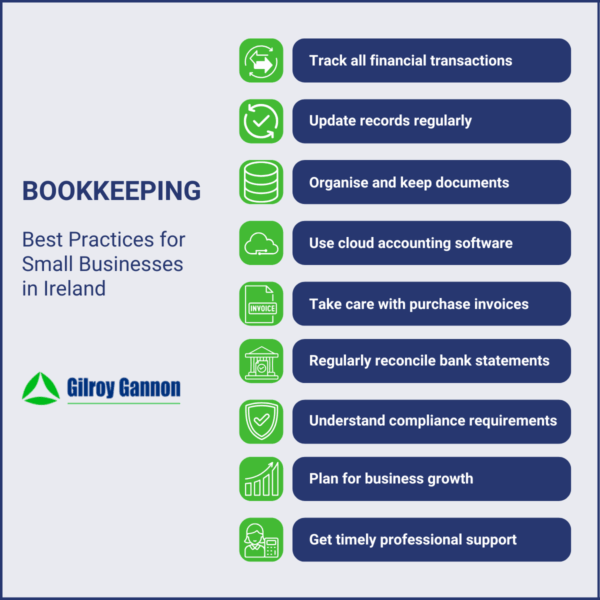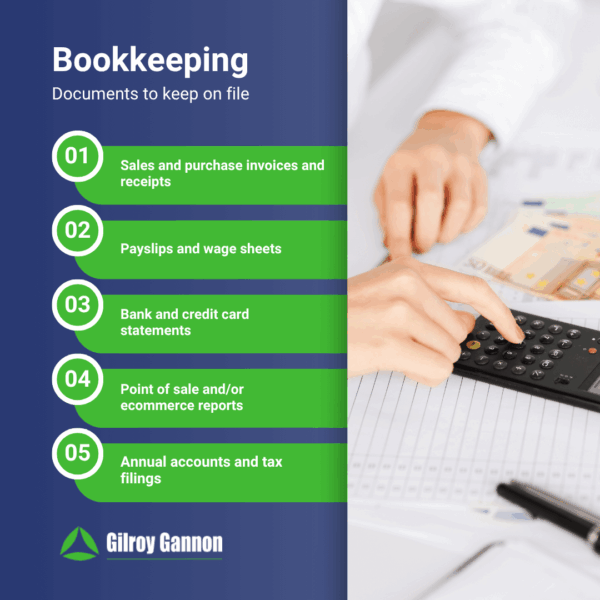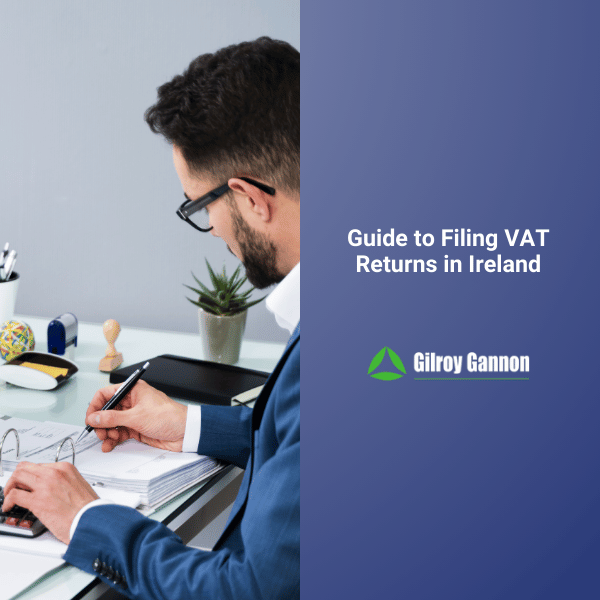Bookkeeping Guide for Small Businesses in Ireland

Bookkeeping is an administrative/accounting task that ensures you know what your business has earned, what you have spent, who owes you money, and who you owe, including the Revenue. This makes bookkeeping an essential task for running your business.
Bookkeeping is also essential for compliance, such as ensuring records are accurate and documents are available for review whenever needed.
In this guide to bookkeeping for small businesses in Ireland, we will give an overview of the key tasks involved in bookkeeping and why bookkeeping is important. We’ll give you bookkeeping best practices and tips, and we’ll highlight the mistakes to avoid.
What Are the Essential Bookkeeping Tasks in an Irish Small Business
The main bookkeeping tasks relevant to all Irish small businesses include:
- Recording financial transactions, including correctly categorising transactions
- Reconciling recorded transactions with bank statements
Additional bookkeeping tasks can include:
- Paying bills
- Creation of some financial reports, such as profit and loss statements or balance sheets
Why is Bookkeeping Important?
Bookkeeping is important for compliance, financial oversight, and business planning.
- Compliance – efficient bookkeeping will help you stay on top of tax, VAT, and payroll. It will also help ensure you comply with Irish business and tax laws and regulations.
- Improved cash flow management – staying up to date with bookkeeping tasks will ensure you have a good understanding of cash flow in your business.
- Better decisions – good record-keeping means you can make decisions based on accurate data, especially financial decisions.
- Funding – good bookkeeping will help ensure a smoother process when applying for loans or grants.
- Audit preparedness – up-to-date and accurate bookkeeping will help prepare your business for audits by the Revenue.
What Are the Main Bookkeeping Best Practices?
Bookkeeping best practices involve being accurate and up to date, while also making sure bookkeeping tasks are completed efficiently and in line with the needs of your business.

Track All Financial Transactions
Record all the financial transactions that take place in your business, regardless of the size of the transaction or who is involved. This includes invoices sent and received, sales, purchases, and bank transactions.
Update Records Regularly
Update your bookkeeping records monthly at least, more frequently ideally. Scheduling time for bookkeeping each week or month can help you stay on top of record keeping. If you have just launched a new business or are in the process of doing so, start bookkeeping straight away.
Organise and Keep Documents
Financial documents like invoices, receipts, and bank statements should be kept for a minimum of six years.
You should plan and organise the storage of your bookkeeping documents, so they are easy to save and then access later. For example, scan or photograph paper receipts so they can be stored in the same location as electronic records. It’s also helpful to have a storage structure, such as saving documents by month.

Use Cloud Accounting Software and Automate
Cloud accounting software can do a lot of the heavy lifting, while also making bookkeeping tasks easier and more accurate through automation and semi-automation.
Cloud software is easy to maintain and incurs minimal costs, usually charged on a monthly basis.
With cloud accounting software and automation functionality, you will have more time to focus on other tasks. Other benefits include:
- Fewer errors
- Make better decisions
- Get better visibility of business finances, especially cash flow
Remember, even when you use cloud accounting software and you manage bookkeeping in-house, you are likely to still need an accountant to file your end-of-year accounts and tax returns.
Take Particular Care with Purchase Invoices
Accurate purchase invoice records are essential to ensure you submit proper VAT returns. The best approach when handling purchase invoices is to record them as soon as possible. Make sure you also match purchase invoices with payments when payments are received.
Regularly Reconcile Bank Statements
Your bank statements (i.e., your banking activity) should match the transactions you have recorded. Therefore, it is best practice to regularly reconcile your bank statements to make sure this is the case.
Understand Your Compliance Requirements
Limited companies and sole traders have different bookkeeping requirements under Irish law. Effective and efficient bookkeeping is essential for ensuring your limited company meets its obligations.
Plan for Business Growth
Bookkeeping can become more complex and time-consuming as your business grows. Financial records become more detailed and complex, for example, and compliance requirements can become more onerous.
Planning for business growth early will help you stay on top of your finances, keep business administration up to date, and help with ongoing compliance.
Understand When to Get Professional Support
Getting professional accounting and bookkeeping support will help your business grow and achieve its objectives. Examples of situations where you should consider getting professional support include:
- Bookkeeping tasks have become too time-consuming, so they are taking you away from other aspects of running your business.
- Your finances have become more complex.
- You need professional advice on tax, business planning, exports, diversification, etc.
Bookkeeping Mistakes to Avoid
It is also beneficial to highlight the main bookkeeping mistakes to avoid, as they can be costly and time-consuming to recover from. The main mistakes to avoid include:
- Falling behind in record keeping – it is difficult to catch up on bookkeeping when you fall behind. You can also lose paperwork and forget key details of certain transactions. If you have fallen behind, don’t delay any longer. The fastest and most effective resolution is often to get support from a bookkeeper or accountant.
- Mixing personal and business finances – personal and business finances should never be mixed together. In particular, if you don’t currently have a business bank account, open one as soon as possible.
- Not having a backup – there is little that is more frustrating in bookkeeping than doing all the work only for the records to be lost. Using cloud accounting software can mitigate this risk. If you keep bookkeeping data storage in-house, make sure you have robust backup procedures in place.
- Categorising expenses incorrectly – take care over this part of bookkeeping as inaccurate categorisations can result in errors in your tax returns.
Bookkeeping for Your Irish Business
This guide will get you started and keep you on the right path in terms of the bookkeeping tasks in your business. If you would like any further information or your business needs professional bookkeeping or accounting support, please get in touch with us at Gilroy Gannon today.
Latest Blog
Check out our blog and you will get the latest news, events, and financial tips from Gilroy Gannon.









